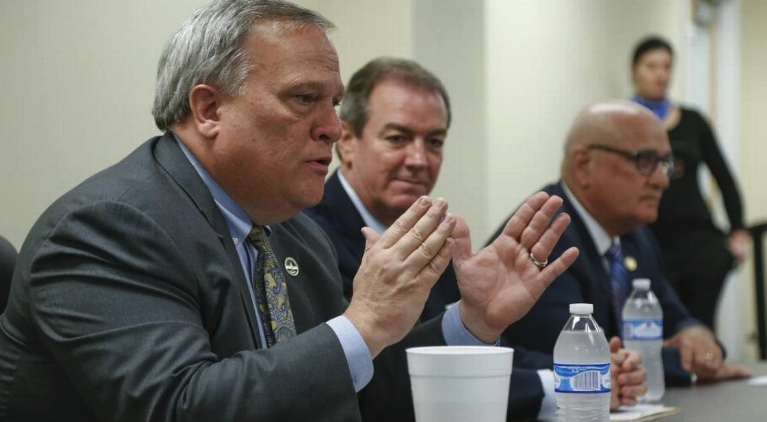
Reprinted from the Herald Leader. Click here to view the article.
By John Cheves and Daniel Desrochers
The newly-filed Senate Bill 1 eventually would eliminate Kentucky’s unfunded public pension liabilities — estimated at $40 billion to $60 billion, depending on whom you ask — while saving the state $4.8 billion, legislative leaders said Wednesday at a Capitol news conference.
Most of the savings would come at the expense of Kentucky’s teachers. According to a financial analysis of the bill’s impact on the Kentucky Teachers’ Retirement System, the state would save $4.07 billion over 20 years by cutting retirement benefits for teachers and shifting some of the state’s costs onto local school districts, which would have to begin contributing 2 percent of payroll for new teachers into “cash-balance” retirement accounts.
“This would be an historic first in the sense that our districts have not had to make retirement contributions for teachers in the past. But at the same time, it’s just another funding shift from the state down to the local level,” said Eric Kennedy, governmental relations director at the Kentucky School Boards Association.
“Some districts will be able to make it work,” Kennedy said. “But there are some among those 10 or 12 districts that already are at the financial breaking point — I mean, it’s going to be tough for some districts to absorb any additional costs.”
Among the benefits cuts, teachers with less than 20 years on the job would have to work until age 60 with at least 35 years of service to collect the maximum possible pension; future teachers would be enrolled in a less generous cash-balance plan that reflected investment returns, rather than a traditional defined-benefits pension based on their salary; and caps would be imposed limiting how teachers could use unused sick leave to boost their retirement benefits.
Possibly the most controversial change would affect the cost-of-living adjustments to teachers’ pensions.
The bill would halve those raises, from 1.5 percent a year to 0.75 percent, for the next 12 years. Because teachers in Kentucky are not eligible to collect Social Security retirement benefits, this would mean that retired teachers would have stagnant incomes through the year 2029, no matter how much inflation hikes prices.
“It is simply a risk management tactic that we believed was appropriate,” explained House Speaker Pro Tem David Osborne, R-Prospect.
Senate President Robert Stivers, R-Manchester, said the savings from that cut would be “virtually the same” as those in the pension plan that Republican Gov. Matt Bevin proposed in October, which would have eliminated retired teachers’ cost-of-living adjustments entirely for five years. Pension raises are not protected by teachers’ inviolable contracts as some other benefits are, Stivers said.
“The pension COLA was never funded at an actuarially sound rate,” Stivers added.
State and local government employees would see fewer changes than teachers under Senate Bill 1 because their retirees haven’t seen a cost-of-living adjustment in years, and most of their new hires have been enrolling in cash-balance plans since the legislature passed its last pension reform bill in 2013.
However, the sort of cash-balance plans that Kentucky offers its public employees would become less generous under Senate Bill 1.
At present, employees and their employers contribute money to an account, where the combined sum is invested until the employee is ready to retire. Unlike a private sector 401(k), where money can be lost, the plans currently guarantee at least a 4 percent return annually regardless of how well the investments actually perform.
Under Senate Bill 1, the 4 percent guarantee would be gone, replaced by a less generous — but still better than a 401(k) — pledge that their accounts will not lose money during market downturns. To achieve that, their accounts will be credited for 85 percent of interest earned; the remaining 15 percent will be held as credit to cover the inevitable slumps.
Stivers said lawmakers studied whether to switch future public employees all the way over to 401(k)-style, defined-contribution accounts, which Bevin and other conservative leaders wanted. But a fiscal analysis showed that such a change would cost the state an average of $400 million over 20 years, in part by adding strain to the state’s already struggling defined-benefits pension funds for teachers and state workers.
“You’re having to fund a new system without adding funds to the old system,” Stivers said. “Therefore, you don’t have but one contributor to the old system — that’s the state.”
Other changes for state and local government employees include a cap on using untapped sick leave to enhance retirement benefits, similar to the one for teachers, and a 3 percent paycheck deduction for retiree health care costs for some workers hired between 2003 and 2008 who are not currently paying into that program, as other workers are.
In a prepared statement Wednesday, the Kentucky Public Pension Coalition, an advocacy group representing public employees, commended the bill for its commitment to fully funding the pension systems.
“That being said, Senate Bill 1 is still unacceptable,” group spokesman Andrew Collier said. “After a brief review, we are very concerned about many aspects of the bill that harm dedicated public servants, including unfairly reducing the benefits they have earned. We look forward to a more in-depth review of this bill in the coming days.”
The bill’s primary sponsor, state Sen. Joe Bowen, said he does not anticipate any “push-back” from teachers or other public employees. That’s just as well, Bowen said, because lawmakers aren’t going to accept changes to the bill even if people do raise objections.
“No, this bill is pretty solid,” said Bowen, R-Owensboro. “We’ve made countless concessions. You know, the bill looked initially different than it does now.”